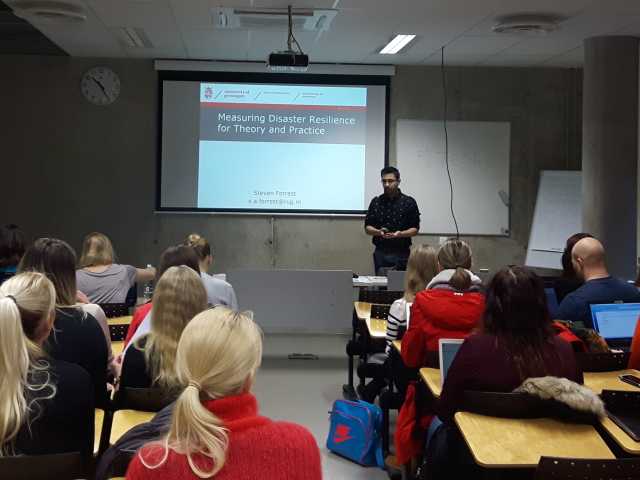Resilience in Spatial Planning: Course delivered at Tallinn University
| Date: | 12 December 2017 |
| Author: | Steven Forrest and Elen-Maarja Trell |

Dr Elen-Maarja Trell and Steven Forrest travelled to Tallinn University (Estonia) to deliver a two day course on resilience. The course was an ‘Introduction to Resilience in Spatial Planning’ and involved approximately 40 students from Tallinn University’s Urban Governance and Environmental Governance Master degree programmes.
The course aimed to provide an introduction to the concept of resilience and its operationalisation in the field of spatial planning. Elen delivered lectures on ‘An introduction to the concept resilience with examples from different spatial sciences research domains’ and ‘Rural resilience & renewable energy landscapes in the Netherlands’. Steven focused on community resilience and flood resilience with lectures on ‘Community Resilience to Flooding: The rise of citizen involvement’ and ‘Measuring Disaster Resilience for theory and practice’.
The second day of the course provided an opportunity for students to put what they had learnt from the lectures into practice with an interactive resilience game based on flood risk in Groningen. The game involved students taking on the role of relevant local level flood risk management actors in Groningen province, such as water authorities, farmers, tourism industry and provincial government. The students then had to debate and discuss how their group would understand and operationalise the concept of resilience in order to make a more flood resilient Groningen. This game was first used in the Young Wadden Academy’s ‘Ditching the Dikes’ workshop in June 2017 and this course was the second time it had been played. The students came up with a variety of different strategies with many groups deciding to reduce the number of dikes or move the dikes further inland in order to create more space for water with the aim of being more adaptive. Several groups suggested relocating citizens in order to flood areas of the province of Groningen and argued that ‘you cannot keep fighting against the nature’. The students rethought how the space was currently used and imaged using the newly-flooded areas for algae farming (for biofuel generation), as areas of natural wetland, or to extend the current UNESCO World Heritage site.
In addition to delivering the course, Elen and Steven also presented at a seminar for the Centre for Landscape and Culture at Tallinn University. Elen introduced the University of Groningen and presented an overview of the research being conducted at the Department of Spatial Planning and Environment. Steven then presented his PhD research on ‘Local level flood resilience in England and the Netherlands’ (more information on the seminar). This was followed by a discussion over the use of resilience in theory and how this can be operationalized in practice.
Elen and Steven would like to thank Paul van Steen (University of Groningen) for his support in arranging the Erasmus Teaching Mobility Grant and prof. Helen Sooväli-Sepping (Tallinn University) for inviting and supporting them in delivering the course in her Master degree programmes.
More information: Dr Elen-Maarja Trell is an Assistant Professor in the Department of Planning and is the Coordinator of the Coastal Resilience Research Group (CRRG). Her research focuses on ‘governing for resilience at the local level’. Elen is also the coordinator of the Master Socio-Spatial Planning and for the Double Degree Master Water and Coastal Management. Steven Forrest is a current PhD researcher in the Department of Planning and part of the CRRG. His research focuses on flood resilience at the local level in England and the Netherlands. Steven aims to make his research findings more accessible to the wider public through his videos (Lego video on flood resilience; discussion of his research) and his work with the PhD MindMint platform.

